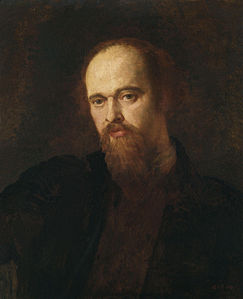Analysis of Boulogne To Amiens And Paris (3 to 11 P.M.; 3rd Class)
Dante Gabriel Rossetti 1828 (London) – 1882 (Birchington-on-Sea)
Strong extreme speed, that the brain hurries with,
Further than trees, and hedges, and green grass
Whitened by distance,—further than small pools
Held among fields and gardens,—further than
Haystacks and windmill-sails and roofs and herds,—
The sea's last margin ceases at the sun.
The sea has left us, but the sun remains.
Sometimes the country spreads aloof in tracts
Smooth from the harvest; sometimes sky and land
Are shut from the square space the window leaves
By a dense crowd of trees, stem behind stem
Passing across each other as we pass:
Sometimes tall poplar-wands stand white, their heads
Outmeasuring the distant hills. Sometimes
The ground has a deep greenness; sometimes brown
In stubble; and sometimes no ground at all,
For the close strength of crops that stand unreaped.
The water-plots are sometimes all the sun's,—
Sometimes quite green through shadows filling them,
Or islanded with growths of reeds,—or else
Masked in grey dust like the wide face o' the fields.
And still the swiftness lasts; that to our speed
The trees seem shaken like a press of spears.
There is some count of us:—folks travelling-capped,
Priesthood, and lank hard-featured soldiery,
Females (no women), blouses, Hunt, and I.
We are relayed at Amiens. The steam
Snorts, chafes, and bridles, like three-hundred horse,
And flings its dusky mane upon the air.
Our company is thinned, and lamps alight:
But still there are the folks in travelling-caps—
No priesthood now, but always soldiery,
And babies to make up for show in noise,
Females (no women), blouses, Hunt, and I.
Our windows at one side are shut for warmth;
Upon the other side, a leaden sky,
Hung in blank glare, makes all the country dim,
Which too seems bald and meagre,—be it truth,
Or of the waxing darkness. Here and there
The shade takes light, where in thin patches stand
The unstirred dregs of water.
Hunt can see
A moon, he says; but I am too far back.
Still the same speed and thunder. We are stopped
Again, and speech tells clearer than in day.
Hunt has just stretched to tell me that he fears
I and my note-book may be taken for
The stuff that goes to make an “émissaire
De la perfide.” Let me abate my zeal:
There is a stout gendarme within the coach.
This cursed pitching is too bad. My teeth
Jingle together in it; and my legs
(Which I got wet at Boulogne this good day
Wading for star-fish) are so chilled that I
Would don my coat, were not these seats too hard
To spare it from beneath me, and were not
The love of ease less than the love of sloth.
Hunt has just told me it is nearly eight:
We do not reach till half-past ten. Drat verse,
And steam, and Paris, and the fins of Time!
Marry, for me, look you, I will go sleep.
Most of them slept; I could not—held awake
By jolting clamour, with shut eyes; my head
Willing to nod and fancy itself vague.
Only at Stations I looked round me, when
Short silence paused among us, and I felt
A creeping in my feet from abrupt calm.
At such times Hunt would jerk himself, and then
Tumble uncouthly forward in his sleep.
This lasted near three hours. The darkness now
Stayeth behind us on the sullen road,
And all this light is Paris. Dieu merci.
PARIS. Saturday Night, 29.
Send me, dear William, by return of post,
As much as you can manage of that rhyme
Incurred at Ventnor. Bothers and delays
Have still prevented me from copying this
Till now; now that I do so, let it be
Anticipative compensation.
Numéro 4 Rue Geoffroy Marie,
Faubourg Montmartre, près des Boulevards.
Dear William, labelled thus the thing will reach.
| Scheme | xaxxxbxxcxdaxxxxcxdxxxexfGxxfhxfxGxgxxfcfixxjeffxxxxjgxxxxxklxxxmxxmlxxa hxkxxibfxx |
|---|---|
| Poetic Form | |
| Metre | 1011101101 1011010011 111010111 1011010101 10110101 0111010101 0111110101 0101010101 1101001101 1110110101 1011111011 1001110111 0111011111 1010101 0110110011 0100011111 101111111 0101101101 011111101 11111111 10111011101 01010111101 0111010111 11111111001 10011101 111010101 1111101 110111101 011110101 10100110101 11110101001 1101111 0101111101 111010101 10101111111 0101010101 1011110101 111101111 1101010101 0111101101 011110 111 0111111111 1011010111 0101110101 1111111111 1011111101 01111111 111110111 110110101 111011111 1001001011 111111111 1011111111 1111011111 1111011001 0111110111 1111111101 1111111111 0101000111 1011111111 1111111101 110111111 1011010011 1011011111 1101011011 0100111011 1111110101 10110011 11011100101 101110101 011111011 101001 1111010111 1111110111 011110001 11010111001 1111111111 1010 11110001 11011110 1101010111 |
| Closest metre | Iambic pentameter |
| Characters | 3,566 |
| Words | 640 |
| Sentences | 35 |
| Stanzas | 2 |
| Stanza Lengths | 72, 10 |
| Lines Amount | 82 |
| Letters per line (avg) | 34 |
| Words per line (avg) | 8 |
| Letters per stanza (avg) | 1,381 |
| Words per stanza (avg) | 315 |
Font size:
Submitted on May 13, 2011
Modified on March 05, 2023
- 3:12 min read
- 96 Views
Citation
Use the citation below to add this poem analysis to your bibliography:
Style:MLAChicagoAPA
"Boulogne To Amiens And Paris (3 to 11 P.M.; 3rd Class)" Poetry.com. STANDS4 LLC, 2024. Web. 28 Apr. 2024. <https://www.poetry.com/poem-analysis/7509/boulogne-to-amiens-and-paris-%283-to-11-p.m.%3B-3rd-class%29>.


Discuss this Dante Gabriel Rossetti poem analysis with the community:
Report Comment
We're doing our best to make sure our content is useful, accurate and safe.
If by any chance you spot an inappropriate comment while navigating through our website please use this form to let us know, and we'll take care of it shortly.
Attachment
You need to be logged in to favorite.
Log In